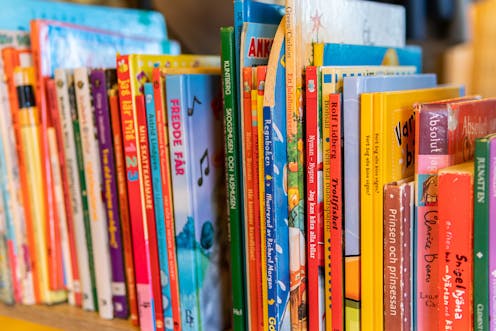
Drag story hour is “nothing other than indoctrination and sexualisation of children”, claimed Sweden Democrats politician Jonathan Sager during a session of the local parliament in Kalmar, southern Sweden, in 2022. He was reacting to plans to organise a drag story hour event at the local library, where drag queens would read to children, challenging norms of gender and sexuality. He called (unsuccessfully) for the event to be cancelled.
For someone not familiar with recent political trends in Sweden, Sager’s view may seem out of character for a country known for its tolerance and progressive approach towards sexual minorities. But just like other countries, Sweden is experiencing a backlash against drag story hour events. Public libraries have repeatedly been the target of hatred and threats from radical right actors, including politicians. Culture wars, often associated with the polarised political climate of the US, have now firmly taken root in Scandinavia.
In the US, objections against drag queen story hour form part of a larger wave of protests against LGBTQ+ content in libraries, also manifested in attempts to have certain books banned. Although book bans are not as common in Sweden, tensions have arisen over what children read and who reads to them.
As a result, public libraries, and especially their reading promotion activities for children, are now at the centre of polarising conflicts between the radical right and its opponents.
Sweden is far from immune to the global growth of far-right influence. Sweden Democrats (Sverigedemokraterna or SD), became the second largest party in the national parliament following the most recent election in 2022. The current government depends on their support to function. The party has neo-nazi roots and, despite cleaning up appearances, its representatives still push overtly anti-immigration, white supremacist viewpoints.
Like many parties of the radical right, SD promotes a conservative view on culture, gender and family, so its opposition to drag story hour is not surprising. However, there is a deeper conflict over the future of Swedish society at play here, too.
We looked at five instances of political conflict around drag events at libraries in Sweden, finding common themes of dispute over culture and what constitutes a good society.
‘Defending’ our children
In Kalmar, as well as in Trelleborg, another municipality in southern Sweden, local Sweden Democrats have (unsuccessfully) tried to block drag story hours at libraries by arguing that they were “defending” children. In Kalmar, the organiser was accused of “sexualising children”, as though there is something inherently sexual about a drag queen wearing a dress. Sager argued that material that is “gender creative, gender critical or norm critical” should not be used for events involving children.
Historically, reading promotion activities are part of this fear of harmful influence. For instance, certain types of fiction have been portrayed as having a demoralising effect, leading to initiatives that encourage children to read “quality literature” instead. In Sweden, there is less of a debate around the content of children’s literature, so there aren’t US-style arguments about banning books. But there are heated conversations around the act of reading, especially with children.
Reading together teaches children to support democratic values, such as by fostering empathy and understanding. Drag story hour fits well with this perspective because it promotes values of acceptance, diversity and positive self-identification. These are values that are expressions of the characteristic emphasis on equity and pluralism in Swedish cultural policy.
But by ticking these boxes, drag story hour clashes with the politics of the radical right, making the conflict emblematic of a larger tussle over the direction of Nordic cultural policy.
The dilemma of the safe space
The dispute around drag story hour has also inflamed arguments about the meaning of safety in a modern society. Is the safest option to bring security into a library or does that very security compromise the library as a safe space?
In the municipalities of Älmhult and Olofström, in southern Sweden, libraries decided against holding drag story hours because of safety concerns. They felt that bringing in guards was not an option because that would be “completely at odds” with the openness of the library. Visible security measures were seen as incompatible with being a safe space.
In Malmö, drag story times went ahead with security guards in place. Here, a decision had been made that security measures enabled the library to be a safe space via drag story hour.
The controversies over drag queen story telling events at public libraries in Sweden continues. Recently, a drag queen story group filed a charge against 106 people – including five SD politicians – for hate crimes. At the same time, public libraries in many parts of Sweden continue to report successful story telling arrangements in the face of opposition from the radical right.
Fredrik Hanell has received research funding from the Crafoord Foundation (ref. no. 20210680). He is affiliated with the Swedish Green Party.
Hanna Carlsson and Lisa Magdalena Engström do not work for, consult, own shares in or receive funding from any company or organisation that would benefit from this article, and have disclosed no relevant affiliations beyond their academic appointment.
This article was originally published on The Conversation. Read the original article.







